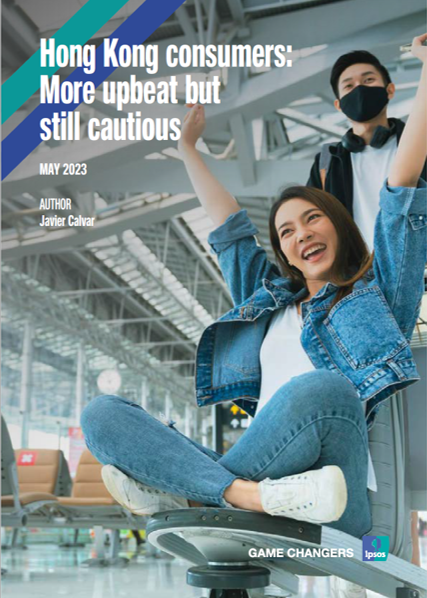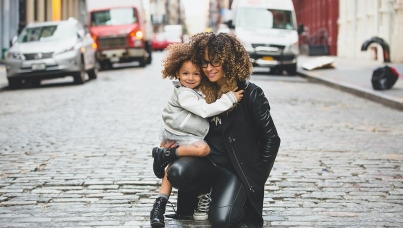Hong Kong consumers: More upbeat but still cautious
 THE PANDEMIC IS (ALMOST) BEHIND US
THE PANDEMIC IS (ALMOST) BEHIND US
Back in June last year, our New Normal1 data showed that 42% of Hong Kong residents expected the threat of covid-19 to be over by the second quarter of 2023 – they were right. With borders reopened and the last covid-related restrictions now lifted, our latest data (collected in April) show that more than half (53%) of the Territory’s residents are doing most of the things they used to do pre-covid and feel the pandemic is behind them.
As a result, a more positive state of mind is replacing the negative feelings that were so prevalent only a few months ago. For the first time since the beginning of the pandemic, more than half (51%) of Hong Kongers feel optimistic, compared to just over one in three (35%) back in December. Similarly, more people feel empowered now than at the end of last year (31% vs. 21% - see Figure 1).
![]()
UPBEAT ABOUT HONG KONG’S ECONOMY …
Hong Kong’s economy contracted by 3.5% in 2022, the fourth quarter of last year alone seeing a drop of 4.2% in economic activity. It was therefore no wonder that in December two-thirds (67%) of Hong Kong residents thought the Territory’s economy was in poor shape.
With borders open again and expectations of local GDP to expand 3.5% in 2023, residents feel much more upbeat about the Territory’s economy and, for the first time since we’ve been tracking this, the majority (61%) feel Hong Kongers current economic situation is good, compared to 33% in December last year.
Looking ahead, most Hong Kongers (70%) believe the global economy will be stronger in 2023 than it was in 2022. This optimism transcends into their personal realm, three-quarters (75%) expecting 2023 to be a better year for them personally than 2022.
… BUT CHALLENGERS REMAIN POST-COVID
As a large proportion of Hong Kong residents are putting the pandemic behind them and moving on with life, covid-19 has all but disappeared as a source of concern. However, other issues are becoming particularly pressing: inflation, health and personal finances (see Figure 2).
Inflation and rising prices top the list of concerns for one in four people (25%). This has worried Hong Kongers since the early part of 2022. Of course, the cost of living has a direct impact on people’s finances, so 19% also say they are concerned about their personal finances.
![]()
Compounding these concerns is the general fear that inflation will rise over the course of the next 12 months, 64% of Hong Kong residents expecting this to happen. Thus, more than one in three people (37%) worry that their disposable income will fall and a similar proportion (34%) that their standard of living will also decline as a result.
While the majority attribute the Territory’s rising cost of living to the state of the global economy (79%) and the pandemic (69%), the government and businesses are seen as culprits, too: over two-thirds (68%) of Hong Kong residents blame the government’s policies and a similar proportion (63%) point to businesses being too greedy and making excessive profits.
This is an important message for both the government and the business community alike. On the government front, Ipsos Global Trends 20232 show that 70% of Hong Kongers worry that the government and public services will do too little to help them in the years ahead. Similarly, trust in businesses among Hong Kongers is also low: only one in three (34%) trust business leaders to tell the truth. However, 79% believe it’s possible for brands to support good causes while also making money.
INCOMES STABILIZE BUT SPENDING REMAINS IN CHECK
Unsurprisingly, the removal of the last covid-related restrictions seems to have had a positive impact on people’s livelihoods. Our latest New Normal data show that 21% of Hong Kong residents were earning less than they did three months earlier, a proportion that increased to 33% among those on household incomes of less than HK$30,000 per month. This is a marked improvement versus what we saw in December, when 36% of local residents had seen their incomes decline in the previous three months, rising to 47% among those on household incomes below HK$30,000 per month.
On the other hand, the vast majority (72%) have seen their incomes stable; this is also a significant improvement versus what we saw in December, when 57% of Hong Kongers had been enjoying stable incomes.
Despite these positive developments and the more upbeat perceptions of the local economy, Hong Kong residents are still cautious about how they spend their money, with the majority keeping tabs on their outgoings and maintaining the same level of spending across categories as they did three months ago. Unsurprisingly, household disinfectant and cleaning products is a category that is being impacted by the fading of concerns about covid-19: while the majority (62%) of consumers claim to be spending the same on such products as they did three months ago, the proportion of those who said to be spending less has gone up to 13%, from 9% in December. The challenge for brands in this category is to find ways to keep their products relevant in a post-covid world.
The changes in shopping habits and lifestyle observed during and after the ‘Fifth Wave’ of covid to manage expenses have remained in place bar some adjustments made in response to the positive developments of the past few months. When shopping, fewer people are looking for deals and couponsor stocking up on items when they are on sale (see Figure 3).
![]()
Similarly, fewer people are saving on restaurants or limiting social and entertainment activities. However, delaying product/ service upgrades and cancelling subscriptions are still on the rise. Overall, though, fewer people are making lifestyle changes to save (see Figure 4).
![]()
GRADUAL RETURN TO STORES
Hong Kongers are gradually returning to brick-and-mortar stores, some reducing their online shopping as a result. The proportion of those who claim to be shopping online as much as they did during the pandemic has declined to 50% from 55% in December, whereas those who are more inclined to return to the stores now account for 50%, up from 45% in December (see Figure 5).
Importantly, overall reliance on both offline and online channels has increased. In April, 79% of Hong Kong residents claimed to be using both offline and online channels to fulfill their shopping needs, up from 75% in December last year.
![]()
KEY TAKE-OUT AND IMPLICATIONS
While the reopening of borders and lifting of the last covid-related restrictions have raised Hong Kongers’ spirits, they remain careful with their hard-earned cash. With private consumption accounting for over 60% of Hong Kong’s GDP, this poses a challenge for policy makers and businesses alike because the economy will grow only when consumers spend – if they don’t, it won’t.
The latest round of consumption vouchers may encourage Hong Kongers to open their wallets a little wider but it is still very early to tell. In the meantime, there are a few things business can do:
- Fears of inflation rising further may make people even more conscious of their diminishing purchasing power. Brands must demonstrate value for money in their offerings, ensuring their ranges cater to the needs of diverse consumer segments and that their price points cover all bases.
- The relevance of different categories changes according to the circumstances. Products such as alcoholic beverages and snacks, which in normal circumstances are seen as necessities, become traits in harder times. Others, such as disinfectants, may lose their roles in people’s lives as fears of covid recede or vanish altogether. Brands in such categories must find ways to stay relevant by understanding the fundamental needs and motivations that drive consumers to purchase such products in the first place.
- Omnichannel shopping is on the rise, with a larger share of consumers relying on both brick-and-mortar stores and online platforms to fulfill their shopping needs. Brands must find out how their consumers use each of such channels and what for, so they can realign their resources accordingly and provide a seamless experience across touchpoints, thus being able to retain and grow their customer base.
- Importantly, as noted in previous newsletters, brands must show empathy, particularly at a time when consumers feel that businesses have a role to play to alleviate the pain inflicted by the rising cost of living.
(1) Ipsos Hong Kong New Normal Tracker monitors changes in consumer sentiment and behaviour in response to the dynamic environment of Hong Kong SAR. Data were collected monthly between April 2020 and June 2021, and quarterly thereafter. Additional markets/ questions available upon request.
(2) Ipsos Global Trends is a regular publication that started in 2013. The 2023 edition is based on survey data collected from 48,541 consumers across 50 economies around the world, thus representing 70% of the global population and 78% of the global economy.


